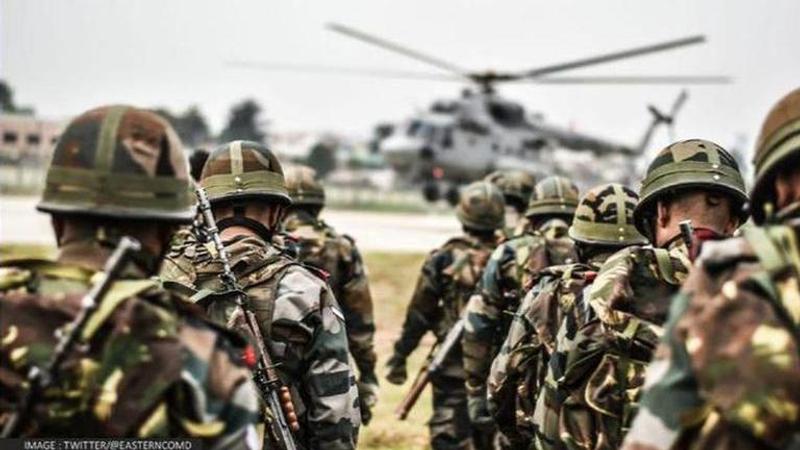Published 00:46 IST, March 24th 2023
Indian Army mulling over technology infusion to counter China’s cyber capabilities: Report
The Indian Army has engaged in the development and integration of Artificial Intelligence, Robotics, Quantum computing and Augmented Reality.

The contemporary landscape of the conduct of warfare has evolved with the infusion of modern smart technology. The Indian Ministry of Defence is actively engaged in efforts to modernise, theaterise as well as indigenise the Indian Armed Forces. The induction of Emerging Technologies is part of the Indian Army’s efforts to enhance its operational capabilities and preparedness to counter misadventures by existing as well as emerging foes. Chief of Army Staff General Manoj Pande recently addressed a seminar on Defence Technology at New Delhi’s Manekshaw Centre. The Indian Army Chief discussed the roadmap for the infusion of technology in the Indian Army.
Gen Manoj Pande #COAS delivered the Keynote Address at the Defence Technology Seminar, being organised at Manekshaw Centre, #NewDelhi. #COAS expressed his views on Emerging Technologies & Roadmap for Technology Infusion in the #IndianArmy. 1/2#IndianArmy#OnPathToTransformation pic.twitter.com/yQqkZV6lpM
— ADG PI - INDIAN ARMY (@adgpi) March 22, 2023
In bids to modernise the defence as well as the offence element and upgrade its effectiveness in carrying out operations, the Indian Army has engaged in the development and integration of Artificial Intelligence, Quantum computing, Augmented Reality, Robotics, Autonomous Systems, and Cybersecurity. Notably, in the current geo-political scenario, China poses a significant threat to India’s national security. According to a report by India-based independent think tank CLAWS (Centre for Land Warfare Studies), China’s cyber operations which include cyber-espionage, cyber-attack and cyber-influence seek to disrupt the target nation’s political, economic and military functioning.
India’s options in countering Chinese cyber operations
Addressing the Def-Tech seminar, Chief of Army Staff General Manoj Pande mentioned the lessons learnt by the nation from the ongoing war between Russia and Ukraine. The Indian Army Chief stressed the significance of achieving self-reliance in the defence sector and further called for the integration of modern technology and warfighting systems to enhance the Indian Army’s operational capabilities.
"Our transformation has as its edifice five pillars - one of which is Modernization and Technology Infusion,” COAS General Manoj Pande said during the address. The Army Chief further stressed that major initiatives are underway to transform the Indian Army into a “technology-driven, Aatmanirbhar and battle-worthy force,” which will enable it to execute its “operational mandate, more effectively." Notably, as per the latest Global Cyber Security Index 2020, India ranks 10th while China occupied the 33rd spot in the index. However, a Belfer Center for Science and International Affairs report ranked China at the second spot in the National Cyber Power Index. Meanwhile, India was ranked 21st among the 30 nations analysed.
Image: Twitter/@adgpi (Gen Manoj Pande testing the AR technology at Def-Tech seminar)
Notably, even though India’s cyber-defence capabilities make the nation’s cyberspace more secure, its offensive capabilities in the cyber domain require a major push, the CLAWS report indicated. The development of Deterrence Capability to counter China’s cyber operations has been cited as a potentially effective step by the report. The CLAWS report suggests the Indian Army avoid offensive cyber operations and focus on the defensive aspect.
“It is strongly recommended that no offensive cyber operations be carried out at the army's tactical, operational, and strategic levels,” the report said while citing the example of a malicious computer worm called ‘Stuxnet’ which was first discovered in 2010. “Stuxnet did not remain within the confines of Iranian Nuclear Installations,” the report stressed. Meanwhile, as a response to China's cyber operations, the Indian Army has focussed on strengthening its cybersecurity capabilities. Measures taken by the Indian Army to counter China's cyber operations include:
Establishment of dedicated cybersecurity cells: The Indian Army has set up dedicated cybersecurity cells, such as the Directorate of Information Warfare, to enhance its capabilities in dealing with cyber threats.
Conduct of cybersecurity exercises: The Indian Army regularly conducts cybersecurity exercises to test its preparedness and identify areas that need improvement. For example, in 2020, the Indian Army conducted a two-day-long exercise called 'Hackathon' to test its cybersecurity preparedness.
Collaboration with other agencies: The Indian Army collaborates with other agencies, such as the National Technical Research Organization (NTRO) and the Defence Research and Development Organization (DRDO), to enhance its cybersecurity capabilities.
Updated 00:46 IST, March 24th 2023





